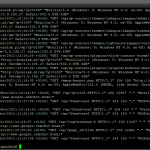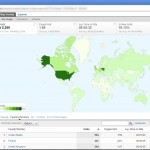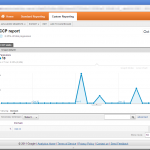 Who should read this post
Who should read this post
My fellow EVE bloggers and all other webmasters who care about their site and would like to have more visitors.
Logs vs Reports
Many website admins have to decide which is better for analysing traffic on their website. I was struggling with answering this question as well, but the latest improvements introduced by Google (Real Time (beta) or Intelligence Events) make Analytics a great tool, that no logs or log parsers can compete with.
Raw Apache logs are very useful for most anything – from analyzing the number of “hits” on the website, to debugging errors in the PHP code. Unfortunately, they do not gather as much information as Google does. Analytics on the other hand uses cookies to track users movement around the website and allows to discern returing users from new ones. It also collects information such as screen resolution, flash and java versions, language, website loading time, the domain of the visitor or approximate location based on GeoIP.
 I used to favor Apache logs, because with tools such as Webalizer it was possible to see graphs and trends of visits. When skimming through the raw log it is also possible to see the IP address and other corresponding data such as OS and browser versions. Unfortunately, neither raw logs, nor the reports based on them are going to say anything more than that, not to mention that raw logs are not the easiest (or interesting in that matter) things to read.
I used to favor Apache logs, because with tools such as Webalizer it was possible to see graphs and trends of visits. When skimming through the raw log it is also possible to see the IP address and other corresponding data such as OS and browser versions. Unfortunately, neither raw logs, nor the reports based on them are going to say anything more than that, not to mention that raw logs are not the easiest (or interesting in that matter) things to read.
And there comes Google Analytics. You can’t access the raw data gathered by Google, but Analytics reports are very useful, not just for bloggers, but also for big websites and e-commerce based companies. Moreover, you can create your own custom reports,which can be based on any of the available metrics.
But why am I saying all of this to you?
Because thanks to Analytics I was able to make some very interesting findings. For one, I know that CCP devs have been visiting my website since I started publishing information about Crucible (so I have promptly added the copyright notices everywhere 😉 ). I know that an Asus EEE Pad Transformer owner from Ontario has visited my website (and I think I know who is that 😉 cheers to Kirith Kodachi).
 I know that most EVE Online players come from US, UK Russia and Germany. I know that most of the visits come from Google search. Twitter and various forums only make a fraction of percentage in my incoming traffic.
I know that most EVE Online players come from US, UK Russia and Germany. I know that most of the visits come from Google search. Twitter and various forums only make a fraction of percentage in my incoming traffic.
I know what keywords people used to land on my website and what information to feed them with to achieve more visits. Of course this information/opinions need to have proper quality, because otherwise these users will not return. Posting accurate information is crucial. When visitors consider your information important and accurate, they are more likely to spread it further, this includes forum links or sharing on Twitter and other social networks.
One day my post about Cockroach ship has received about 150 hits in just one hour. I wondered why people would out of a sudden begin looking for a ship, which is hid deep in the EVE data dump, and is rarely seen by players. So I started investigating. My post was quite high on the Google search for the keywords containing “eve online cockroach”, so the question remained, what is the root cause. I quickly found it was a Facebook post of CCP employee, who linked a killmail of one of the GMs, who lost his Cockroach to a group of players.
Can your webserver logs tell you this much?
I don’t think they can. So now go and connect your blog to Analytics. You will not regret, it’s a very powerful tool.



Indeed, that would most likely be me, I browse a lot of blogs on my Asus.
Browsing through Analytics reports will most likely result in lots of thinking, connecting facts and can lead to interesting findings. Noticing your Transformer was one of these.
And of course website optimizing is not just content optimizing. Google also stores the loading times so you can optimize the code (if you are into programming) as well. No wonder website optimization is slowly becoming a science of its own.